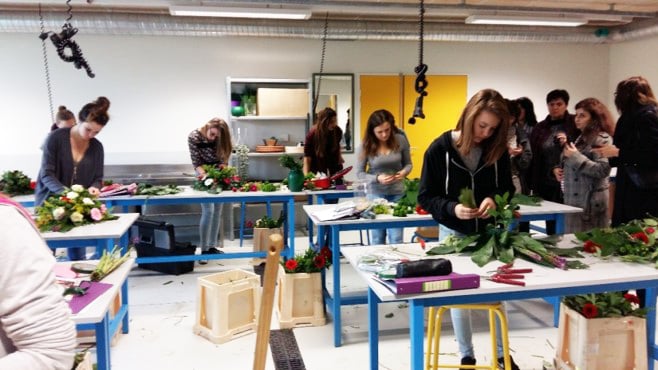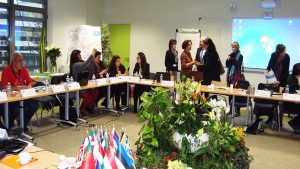QUAKE and ECVET: Action from the Ground Up
ECVET is a fram ework for transferring and recognising learning outcomes across VET learning environments. QUAKE is a 2014 Erasmus+ KA2 VET cross-sectoral project that set out to develop the capacity of VET teachers to implement ECVET. Mary Immaculate College in Limerick was one of five partners in the project. Dr. Cathal de Paor, Director of Continuing Professional Development at the college, reflects on the project here.
ework for transferring and recognising learning outcomes across VET learning environments. QUAKE is a 2014 Erasmus+ KA2 VET cross-sectoral project that set out to develop the capacity of VET teachers to implement ECVET. Mary Immaculate College in Limerick was one of five partners in the project. Dr. Cathal de Paor, Director of Continuing Professional Development at the college, reflects on the project here.
QUAKE is the acronym for QUAlifcation Knowledge ECVET. It is a Strategic Partnership project between seven partners from five European countries: Belgium, Bulgaria, France, Ireland and Spain. We chose the name to reflect our attempt to ‘shake things up a bit’ in the world of horticulture qualifications! However the official project title ECVET: from the design for learners, to the professionalisation of teachers conveys more fully what the project has been trying to do, and for whom.
While ECVET focuses on the learner, the professional practice of teachers is key to realising its potential. QUAKE involved the mobility of both learners and teachers, but we put a particular emphasis on the ‘mobilisation’, and not just the mobility, of teachers. The project focused on one vocational domain only – horticulture – and one level, EQF level 4. This helped ensure the involvement of a sufficient number of teachers working in similar contexts. It also explains the composition of the partnership, which included Ministries of Agriculture, Ministries of Education, higher education institutions involved in the preparation of VET teachers and other horticultural professionals. It also included a VET provider with access to learners in horticulture schools/colleges and enterprises.

Sowing the Seeds for ECVET
The project had a range of activities over its three year span from September 2014 to August 2017. Our very first activity was to establish a better view of the state of ECVET adoption and VET teacher education within each country in the partnership. An analysis of professional development needs showed that teachers’ levels of awareness about ECVET varied significantly. This analysis informed the design of the first programme of continuing professional development. In November 2015, training was delivered in Orléans, France to 25 teachers (five from each country of the partnership). Teachers were also able to identify possible partners for learner mobility later in the project. The initial training was followed by an online training programme, enabling teachers to continue exploring possibilities and developing relationships. The participating teachers reconvened for a second face-to-face week of CPD in March 2017, this time in Brussels.
Most learner mobilities took place in spring 2017, as the return of the growing season offered more scope for learners and teachers to match practical activities to the learning outcomes being targeted. In total, QUAKE organised mobilities for 25 learners. This was not only an exciting learning experience for the learners, but was the basis for the professional development of over 30 teachers who participated in separate professional development events.
The project has led to the production of a number of documents, including a guide for teachers on how to set up an ECVET partnership. Such a focus on the professional development of teachers reflects the realisation that, apart from the need for the necessary policies at a system level, the use of ECVET depends on the knowledge, skill and attitudes of teachers who will ultimately be the people who drive it and make it happen.

The Fruits of the Project
While the project has not yet finished its work, it is already possible to identify some valuable insights. QUAKE has provided the participating teachers and schools with the knowledge and support required for using ECVET mobilities in their teaching of horticulture. This enabled teachers to deepen their knowledge about teaching, learning and assessment, especially the alignment between what is taught or practiced, what is learned and what is assessed. Some of the mobilities involved a graded assessment of the learners’ achievements against particular learning outcomes, while for others the learning was assessed in a more holistic way, i.e., successful or unsuccessful. Some mobilities were also based on units of learning outcomes that corresponded to a placement or practice module from the learner’s home programme, while other mobilities attempted to target learning outcomes taken from taught modules.
Supporting teachers in designing learning agreements that target learning outcomes from more than one unit or module is something that the project team would like to focus on in the future. How assessment results are incorporated with the learners’ other results in their home institution also emerged as an important issue.
The project results highlight the importance of local autonomy in determining the nature and extent of ECVET use. As shown in the recent CEDEFOP monitoring report, four of the partner countries from QUAKE have credit systems that are compatible with ECVET – France, Spain, Belgium and Ireland, while it is being developed in Bulgaria. And yet there was still great diversity of approaches even between the first four countries. Part II of the ECVET users' guide Using ECVET for Geographical Mobility emphasises the need for trust between teachers and institutions (both sending and receiving) in preparing the ground for a successful ECVET mobility. A key focus in the CPD course therefore related to the assessment of learning outcomes, and the importance of having evidence that demonstrates achievement in a transparent way. The CPD meetings were invaluable in creating the professional relationships that made discussion on these issues possible. The project team is now busy preparing a methodological guide as a basis for a series of national dissemination events in each of the five countries.

Breaking new ground
There is so much about ECVET that is congruent with other trends in education in the 21st century. This includes greater integration between learning across multiple sites, and greater scope for teachers to create engaging learning pathways that take into account the individual needs of learners. There is also the added benefit for teachers that learning about practice in other countries prompts them to reflect more deeply on what they are already doing at home. Overall, the project results show that the implementation of ECVET depends on teachers ‘on the ground’ having the knowledge, inclination and support to embark on partnerships with colleagues in other countries. As in the world of horticulture itself, future growth depends on action from the ground up, as well as from the top down. Support for relatively small-scale projects such as QUAKE is therefore crucial – helping to break new ground for those involved, and to cultivate it for greater returns in the future.
Adapted from an article originally appearing in ECVET Magazine by permission of Cathal de Paor. Find out more about QUAKE on the project website. We welcome contributions to 'Insights' at comms@leargas.ie.
